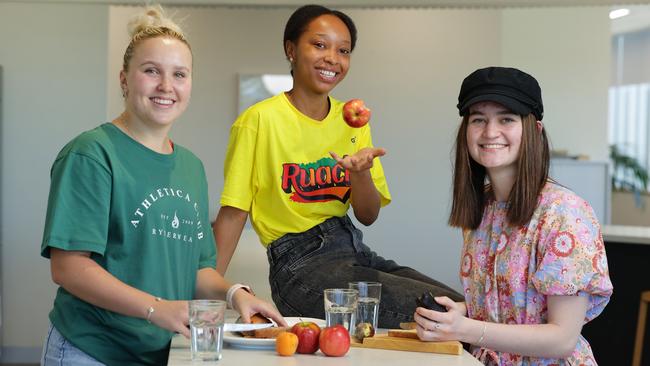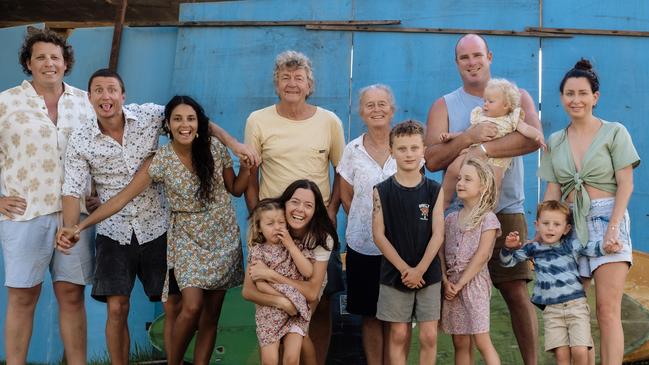Health of the Nation: 12 health and nutrition tips to live a happier life
In just 12 steps, young Australian adults can improve their health dramatically — and it won’t hurt your pocket. See what the best tips are from the experts.
National
Don't miss out on the headlines from National. Followed categories will be added to My News.
As you get older and start managing your own health there are a number of factors you need to take note of – and maintenance is important.
Keeping on top of whether your weight is in a healthy range is vital, so weigh yourself regularly or measure your waist circumference.
Stay on top of preventive health checks for cancer and sexually transmitted diseases and keep your flu and Covid vaccinations up to date.
Make yourself aware of diet and exercise guidelines and try to aim for them to get your life on a healthy track after leaving home.
HOW UNI STUDENTS WILL AVOID BEING ‘FRESHMAN FATTIES’
First-year uni students Anika Rossington and Delphine Kawela are determined not to become “Freshman Fatties”.
The term was coined in the US to describe university students who gain up to 4kg in their first year as they comfort eat and ditch exercise when they move away from home.
But for these Australian Catholic University students, the trick is finding ways to “deal properly” with the stresses of uni life — and maintain good mental and physical health.
“You have to adjust to the new ways of learning … find the balance between life and uni,” Ms Rossington said.

The midwifery student, who moved from country Tenterfield in regional NSW is living away from home for the first time in Brisbane and said being on call in case her clients go into labour required planning food in advance.
Business student Ms Kawela said the party lifestyle was still popular as a way to make friends and blow off steam.
TAKE OUR HEALTH CALCULATOR
HOW GENETIC TESTING SAVED AUSSIES LIVES
Tanya Sedevic was diagnosed with bowel cancer at age 34, when she was 25 weeks pregnant.
And if not for a genetic test, she would never have discovered she carried the cancer-causing genes for Lynch Syndrome.
This spurred her siblings into action — and ultimately saved their lives.
Her 33-year-old sister Mindy Ross was diagnosed with stage 3 bowel cancer, after a precautionary colonoscopy.
Her brother had precancerous polyps in his stomach.

It was consistent with the family’s history of cancer — which for their grandmother proved deadly — but the trio will not be defined by it.
They are now strongly advocating for early genetic testing in young people for preventable cancers and other conditions.
Monash University researcher Paul Lacaze is trialling genetic tests in people aged 18-40 so those who carry risky genes can take preventive measures to avoid cancer and other conditions.
“Knowing that I’ve got Lynch is actually quite empowering because it’s finally an answer to why there’s been so much cancer (in her family) and it’s great because the ball is in my court so I’m in control,” Ms Sedevic said.
“I decided to have a full hysterectomy as a precaution and I also had a mastectomy.”
12 HEALTH CHECKS AUSSIES IN THEIR 20s SHOULD DO
*Check your weight. For men waist circumference should be under 94cm, for women 80cm
*Check your blood pressure at least once a year
*Have a cholesterol check
*Have a dental check up every six months.
*If you are depressed or anxious ask your GP for a mental health check.
*Check your blood sugar and do a diabetes risk test.
*Do regular skin checks to catch cancer early.
*Testicular cancer has a high cure rate if found early self-examine monthly for lumps or swellings.
*Women over the age of 25 who are sexually active should have a Pap test every five years, self tests are available.
*Sexually active young adults should have an annual urine test for chlamydia
*If you are at risk of other sexually transmissible infections, such as HIV/AIDS or herpes get tested
*Consider a genetic test for preventable disease if cancer or heart problems are common in your family
VACCINES
*Covid booster, every six months.
*Flu vaccination, annually.
HOW MUCH EXERCISE YOU NEED
Over 18s
* 2.5 to 5 hours of moderate physical activity per week or 75-150 minutes of vigorous activity.
* strength training at least two days per week.
EXERCISE BENEFITS
* Women who exercise in their 20s retain the benefits well into their 40s – going on to record better heart health.
* Physical activity is 1.5 times more effective than counselling or the leading medications at treating depression, anxiety, and distress.
* Aerobic exercise is especially beneficial, including walking, resistance training, pilates, and yoga.
—Additional reporting by Emma Cam
Originally published as Health of the Nation: 12 health and nutrition tips to live a happier life



